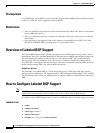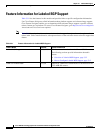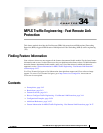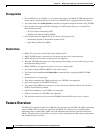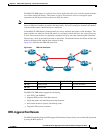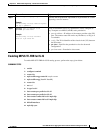
34-2
Cisco ASR 901 Series Aggregation Services Router Software Configuration Guide
OL-23826-09
Chapter 34 MPLS Traffic Engineering - Fast Reroute Link Protection
Feature Overview
Prerequisites
• Cisco IOS Release 15.2(2)SNG or a later release that supports the MPLS TE-FRR link protection
feature must be installed previously on the Cisco ASR 901 Series Aggregation Services Router.
• You should enable the asr901-platf-frr command at the global configuration before using TE-FRR.
• Your network must support both the following Cisco IOS features before you can enable Fast
Reroute link protection:
–
IP Cisco Express Forwarding (CEF)
–
Multiprotocol Label Switching (MPLS)
• Your network must also support at least one of the following protocols:
–
Intermediate System-to-Intermediate System (IS-IS)
–
Open Shortest Path First (OSPF)
Restrictions
• MPLS TE works only on the Switch Virtual Interface (SVI).
• MPLS TE-FRR feature is used only for link protection and not for node protection.
• MPLS deployments that allows 4-label push is not supported.
• When the TE-FRR deployments are in ring topology, hair-pinning can occur while trying to reach
the destination during cutover.
• MPLS TE-FRR is not supported on layer 3 over layer 2 deployments.
• You cannot configure BFD and RSVP on the same interface.
• You should use the no l3-over-l2 flush buffers command before configuring MPLS TE-FRR
feature.
• Path protection is not supported.
• Time-division multiplexing (TDM) psuedowire over TE-FRR is not supported.
• QoS is not supported on the MPLS TE tunnels.
• You cannot enable FRR hello messages on a router that also has Resource Reservation Protocol
(RSVP) Graceful Restart enabled.
• Psuedowire redundancy over TE-FRR is not supported.
• CFM over Xconnect over TE-FRR is not supported.
• The imposition statistics will not work for EOMPLS after the FRR event or layer 3 cutover.
Feature Overview
The MPLS TE is supported on the Cisco ASR 901 router to enable only the FRR. The traffic engineering
aspects of MPLS TE is currently not supported. The MPLS TE is the process of establishing and
maintaining label-switched paths (LSPs) across the backbone using Resource Reservation Protocol
(RSVP). The path used by a given LSP at any point in time is based upon the LSP resource requirements
and available network resources.



